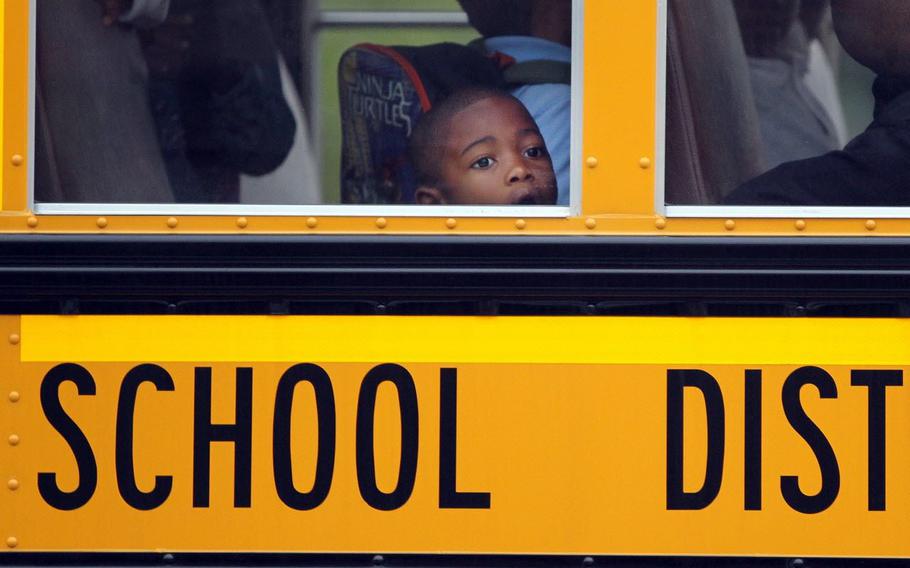
Students arrive at Harvey Rice Elementary School in Cleveland, Ohio on their first day of school on Wednesday, Aug. 13, 2014. (Lisa DeJong/The Plain Dealer)
(Tribune News Service) — Ohio public school districts will soon be required to allow open enrollment of children whose parents are full-time, active duty members of the U.S. Army, Navy, Air Force, Space Force, Marine Corps or Coast Guard.
Gov. Mike DeWine signed Senate Bill 208 on Jan. 8. The General Assembly passed the bill late last year, unanimously in both chambers. It is expected to go into effect on April 9.
Open enrollment occurs when a student who doesn’t live in the school district boundaries is allowed to attend.
Current state law requires school districts to adopt open enrollment policies that do one of the following: totally prohibit open enrollment, with the exception of students who pay tuition; permit open enrollment from adjacent districts; permit open enrollment of students from all districts.
Under HB 208, districts that prohibit open enrollment or limit it to adjacent districts must allow open enrollment of students whose parents are active-duty armed forces members who are stationed in Ohio, and who provide verification of the parent’s status as active duty.
Military families relocate every two to three years. Research shows this is about ten times more often than civilians, said state Sen. Kristina Roegner, a Hudson Republican who sponsored the bill.
“These families are often required to move from temporary to permanent housing, or they relocate to a new state after the school year has started, which in turn impacts their children’s school enrollment,” Roegner said in prepared comments to an Ohio House committee. “… We can ease their transitions by ensuring their children have easy access to the public education system by being allowed to enroll in any Ohio public school.”
The U.S. Department of Defense supported the bill. About 10,000 active-duty service members are stationed in Ohio, and they have about 10,000 children attending school in the state, said Shane Preston, a regional liaison for the department.
No one testified against the bill.
Cassie Barlow, a retired Air Force colonel who was the commander of Wright Patterson Air Force Base in Dayton and now is president for the Strategic Ohio Council for Higher Education, said bills such as SB 208 go a long way in showing members of the military that the state supports them. Her family moved 13 times in 26 years. Her daughter attended 10 different schools in 16 years, she said.
“When it was time to retire, we looked diligently for a community that was friendly and welcoming to the military and responsive and supportive the needs of Military, Veterans, and their families,” she said. “We served in many communities that did not have great Military and Veteran services or resources and we frankly couldn’t wait to depart those communities, and we never thought even once about settling in that community at a point in the future.”
An Ohio House committee loaded the bill with amendments, including:
-Eliminating a requirement that public schools use model curriculum developed by Department of Education and Workforce for high school students on proper interactions with police during traffic stops and other encounters.
-Permitting, instead of requiring, that public schools’ in-service training on the prevention of child abuse, violence and substance abuse be conducted by police or prosecutors with relevant experience.
-Allowing student teachers to substitute teach and receive compensation for it.
-Allowing educational aids or assistants to provide services virtually to students who receive taxpayer-funded scholarships in the Jon Peterson Special Needs and autism programs, two of the state’s voucher programs.
-Renaming the Regional Education Partnership Grant Program the Prenatal-to-Five Early Childhood to Post-secondary Regional Partnerships Program. These regional partnerships are made up of pre-schools, primary and secondary schools, colleges and employers to collaborate to increase educational attainment and economic mobility outcomes for children and adults. The regional partnerships can apply for grants from the state if they demonstrate long-term goals, with measurable metrics, for the education and workforce continuum over time. About $2 million for the grants came from federal COVID-19 funds in the 2020-2022 legislative session.
-Allowing home school families to create learning pods, which are a voluntary association of parents who group their children together for home schooling, as long as one of the parents is on the premises when the pod meets. The law specifies that the pods are not child care and not required to be regulated like daycare centers.
©2025 Advance Local Media LLC.
Visit cleveland.com.
Distributed by Tribune Content Agency, LLC.